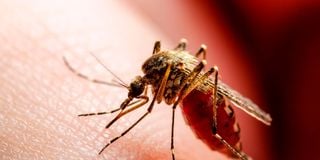Even with blocked scent receptors, mosquitoes still smell humans

Kenyan researchers recently noted that mosquitoes have become smarter and bite more during the day.
What you need to know:
- The researchers explain that female mosquitoes rely on the cocktail of smells that humans and other animals emit to detect the blood they need to nourish their eggs.
- The insects pick up scents through olfactory neurons located primarily on their antennae, which detect and transmit scent information to the brain.
Scientists have found that the sense of smell (olfactory system) of mosquitoes has an inbuilt backup for detecting human scents.
The scientists removed human-scent receptors from the antennae of the mosquitoes and discovered that they could still smell humans.
According to Cell, a global peer-reviewed scientific journal, Meg Younger and her team-mates from Boston University in Massachusetts used CRISPR gene editing technology on female mosquitoes, specifically Aedes aegypti , which is also found in Kenya, to inactivate groups of human-odour receptors on the olfactory neurons in their antennae.
The researchers explain that female mosquitoes rely on the cocktail of smells that humans and other animals emit to detect the blood they need to nourish their eggs.
The insects pick up scents through olfactory neurons located primarily on their antennae, which detect and transmit scent information to the brain.
The researchers expected that removing human-scent receptors from the antennae of mosquitoes would prevent the olfactory neurons from detecting the human scent and relaying this information to the brain; but when they measured neuronal activity as the mosquitoes were exposed to the smell of humans, the insects could still detect the smell.
“This was the last thing that we expected to find,” Ms Younger highlights.
Their explanation is that the odours activated other receptors on the olfactory neurons.
Using the RNA sequencing to find out exactly what was happening on a cellular level, they found that a single olfactory neuron could possess multiple types of receptors rather than just one and that human odour engaged some receptors that hadn’t been inactivated.
Ms Younger is of the view that the discovery that mosquitoes are even better at detecting human scents suggests that efforts to prevent the spread of mosquito-borne disease should be differently directed. “Instead of focusing on gene editing out mosquitoes’ human-scent detectors in the hope they won’t be able to detect people, resources could be channelled into creating more potent traps and repellents, “she observes.
Kenyan researchers recently noted that mosquitoes have become smarter, bite more during the day and are more evasive to a point that they are now overcoming most interventions put in place to take them out.
Dr Dan Masiga, the head of human and animal health at ICIPE, discloses that outdoor biting has lately received increasing attention regarding control of malaria towards elimination while citing a new modeling study which predicted that across Africa, outdoor transmission resulted in an estimated 11 million additional malaria cases annually.
Dr Willis Akhwale, the African Leaders Malaria Alliance, notes that science has shown that mosquitoes are more attracted to some people than others and the reason is partially genetic.
“Mosquitoes need our blood protein to make their eggs. In the past we used to say certain blood groups but now scientists are looking at DNA variations,” he says while explaining that there are particular spots on a human being’s DNA that are more or less likely to make them attractive to mosquitoes.
The presidential malaria advisor further explains that lately scientists are now using Artificial Intelligence (AI) to deal with mosquitoes.
“As experts we have begun to use machine intelligence to augment the decision-making abilities of officials, and explore more effective malaria policy interventions by using different AI algorithms or ‘agents’ to determine the most effective intervention strategies for specific locations. “



